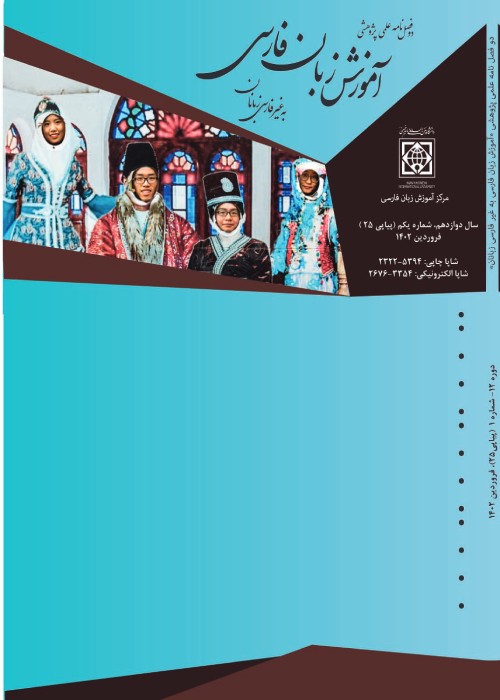Relationships among emotional intelligence, autonomy, self-regulation, willingness to communicate, and reading comprehension ability of Persian foreign language learners: Structural equation modeling
Emphasis on reading comprehension skill of foreign language learners is one of the most significant methodological topics in language learning and teaching. Moreover, individual differencesof learners such as emotional intelligence (EI), autonomy, self-regulation (S-R), and willingness to communicate (WTC) have been recognized as very influential variables in the process of language learning. Therefore, exploring the effects of these variables can be very helpful in the process of foreign language learning, including reading comprehension. Until now, in the literature of teaching and learning Persian as a foreign language, no study has been conducted on the possible relationships or effects of emotional intelligence, autonomy, self-regulation, and willingness to communicate on reading comprehension of Persian foreign language (PFL) learners. The present study attempts to fill this gap. Consequently, the purpose of this nationwide study was to explore the relationships between emotional intelligence, autonomy, self-regulation, willingness to communicate and reading comprehension ability of Persian Foreign Language learners in Iran. For this end, 141 non-Persian students, from 28 different countries in the world, majoring in various fields at 12 universities across Iran, participated in this study. The selected universities were located in the north, south, east, west, center, and other parts of Iran. The universities were: University of Isfahan, Imam Khomeini International University, Bu-Ali Sina University, Shahid Beheshti University, University of Tehran, Shiraz University, Allameh Tabataba'i University, Ferdowsi University of Mashhad, University of Mazandaran, Malayer University, Yazd University, and Yasouj University. The diversity of Persian foreign language learners shows the increasing significance of this language worldwide. The participants were asked to answer a reading comprehension test and the translated Persian versions of emotional intelligence, autonomy, self-regulation and willingness to communicate scales. The results of Pearson Correlation Coefficient indicated that there were positive significant relationships between the four variables; i.e. emotional intelligence, autonomy, self-regulation, willingness to communicate and reading comprehension. The results also revealed positive significant relationships between all sub-components of emotional intelligence (self-emotion appraisal, others' emotion appraisal, use of emotion, and regulation of emotion), autonomy (self-management, willingness to learn, and self-control), and self-regulation (planning, self-checking, effort, and self-efficacy) and reading comprehension. Moreover, in order to assess the strengths of predicting the four independent variables and their sub-components of reading comprehension, multiple and standardized regressions were run. The obtained results showed that the four independent variables and most sub-components were strong predictors of reading comprehension. Also, for providing more insights about the variables and estimating the strengths of the causal relationships among them, Structural Equation Modeling (SEM) was utilized by AMOS 24. The four independent variables were strong predictors of reading comprehension (emotional intelligence: 0.29; autonomy: 0.18; self-regulation: 0.16; and willingness to communicate: 0.43), with WTC being the strongest predictor. Foreign language learners, especially Persian foreign language learners, foreign language teachers, and all individuals involved in foreign language teaching and learning can benefit from the results of the current study. Learners must be aware of their own individual differences and their important effects in their reading comprehension ability and ultimately in the process of foreign / second language learning. They must know that by being able to use their emotions, willingness to communicate, taking responsibility of their actions, and also being actively involved, they are deemed to succeed in their endeavor of learning a foreign language. Teachers, too, can provide great help by becoming aware of the role of learners' individual differences. They can emphasize tasks that utilizes learners' emotional intelligence, autonomy, self-regulation, and willingness to communicate. Curriculum developers, syllabus designers, and materials producers must also pay special attention to these variables. In general, individual differences are very vital in the process of foreign / second language learning and many researchers in Iran and across the world have underlined their role in language learning, and specifically in reading comprehension ability. However, the significance of this study is on the grounds that no study had been conducted to investigate the effects and relations of these variables on reading comprehension for Persian as a foreign language. At the end, we should emphasize that this study did not consider age and gender of the participants. We suggest future researchers explore the effects of these variables. Also, interested researchers can explore the effects of these variables on other language skills; that is, listening, speaking, and writing. There are also other uninvestigated individual differences, such as self-efficacy, creativity, critical thinking, self-esteem, etc. that researchers can study. We hope that the current study and future studies shed light on the role of individual differences on learning Persian as a foreign language.
- حق عضویت دریافتی صرف حمایت از نشریات عضو و نگهداری، تکمیل و توسعه مگیران میشود.
- پرداخت حق اشتراک و دانلود مقالات اجازه بازنشر آن در سایر رسانههای چاپی و دیجیتال را به کاربر نمیدهد.


